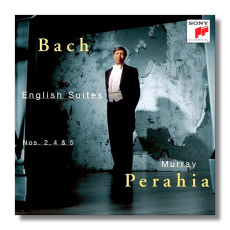
The Internet's Premier Classical Music Source
Related Links
- J.S. Bach Reviews
- Latest Reviews
- More Reviews
-
By Composer
-
Collections
DVD & Blu-ray
Books
Concert Reviews
Articles/Interviews
Software
Audio
Search Amazon
Recommended Links
Site News
 CD Review
CD Review
Johann Sebastian Bach

English Suites #2, 4 & 5
- "English" Suites, BWV 807, 809 & 810 (1729)
Murray Perahia, piano
Sony Classical SK60277 DDD 61:57
If Murray Perahia has made a bad recording, I don't know about it. His recording of the other three English Suites (Sony Classical SK60276, reissued as SK93083) was received well by critics, and so I also wanted to get in on the action and form my own opinion. Fortunately, I hear nothing on this CD to cause me to alter my first statement.
Not everyone accepts Bach on the piano, and if you're one of those people, then nothing Perahia (or anyone else) does is going to change your mind. If you do accept it, then it is only consistent for you to accept the use of all the modern piano's "conveniences," including pedals and the ability to control dynamics to an exquisite degree. Some pianists, such as João Carlos Martins, are quite exuberant in their adaptation – for that's what it is – of Bach's music for an instrument he could have known nothing about. Others, including Perahia, are less aggressive. Indeed, Perahia's Bach is relatively safe. Tempos are within the realm of consensus, articulation is clean but not percussive, and dynamics are no different than what the music itself directly implies. My comments should not be interpreted as an an attack against Martins's pianism, which I deeply admire, but simply as a demonstration of the contrast between his radicalism and Perahia's relative conservatism.
While the English Suites are not as emotional as some of Bach's other large works for keyboard, they provide ample opportunity for gracious and sensitive expression, and Perahia is characteristically responsive to their challenge. He is judicious with the use of embellishment and ornamentation, and he uses these to augment the music's basic emotions. If there's any area where Perahia's interpretation is occasionally (that's very occasionally) less than ideal, it's in the dance movements, which I feel can sometimes wander too far from their dance-related roots. However, it is hard to dispute with Perahia when he makes you smile, as he made me do with the Gigue finale of the fourth suite. Those hunting horns will bring down a fox yet.
This disc is beautifully engineered by Johannes Müller. Perahia plays the Steinway in a warm Swiss venue (the Musica-Théâtre La Salle de Musique in La Chaux-de-Fonds).
Copyright © 1999, Raymond Tuttle




















